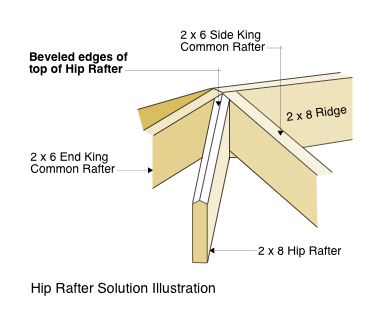Hip roofs can be generally framed into a large variety of sizes that can be t or l shaped and may need a more complex frame.
Name the framing members of a hipp roof.
Similar to a gabled roof a hip roof is also made out of common rafters along with jack rafters and hip rafters.
The main structural parts of a roof are ceiling joists ridge board jack rafter hip rafter common rafters creeper rafters raking plates out riggers and noggings or last rafter overhang.
Purlin a purlin is a horizontal piece of timber or metal which supports the roof s rafters or decking and helps to prevent your roof from sagging.
A hip roof hip roof or hipped roof is a type of roof where all sides slope downwards to the walls usually with a fairly gentle slope although a tented roof by definition is a hipped roof with steeply pitched slopes rising to a peak.
A horizontal timber or metal resting at the peak of the roof the rafters and trusses are connected to the ridge board for a cohesive framework.
This article describes and illustrates the different types of support that prevents roof sagging and wall bulging at buildings including definitions of collar ties rafter ties and structural ridge beams.
Collar ties rafter ties tension beams structural ridge beams.
Framing the hip roof can be more expensive than framing a gabled roof since you need to pay for the labor cost for framing the hips.
It is a waterproofing layer made of regular felt stacked above the solid.
The hip roof is the most commonly used roof style in north america after the gabled roof.
Thus a hipped roof house has no gables or other vertical sides to the roof.
Gable a gable roof has a ridge at the center and slopes in two directions.
As compared to global roof framing hip roof framing is more difficult because it consists of four sides with variable lengths instead of two sides.
A square hip roof is shaped like a pyramid.
A hip rafter extends from the wall plate to the ridge in the angle of a hip roof.
A hip roof or a hipped roof is a style of roofing that slopes downwards from all sides to the walls and hence has no vertical sides.
An example of each is shown in figure 2 1.
The ridge board is centered here in terms of length as well as width.
It is the form most commonly used by.
A composite decking made of solid materials it resembles real wood and particularly strong and stable for bearing heavy load.
Tie down fixings tie down fixings are used to resist uplift and shear forces lateral loads in floor framing wall framing and roof framing.
Some of these can support the roof and prevent ridge sagging and wall spreading.
It not only leads to a chicer look but also makes the building more resistant to wind.

